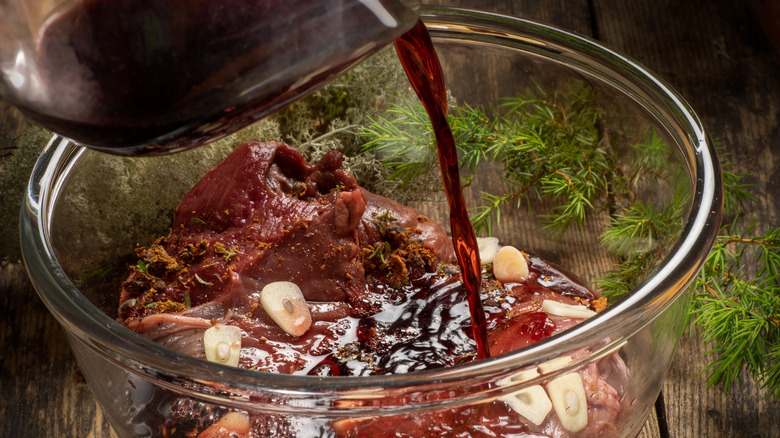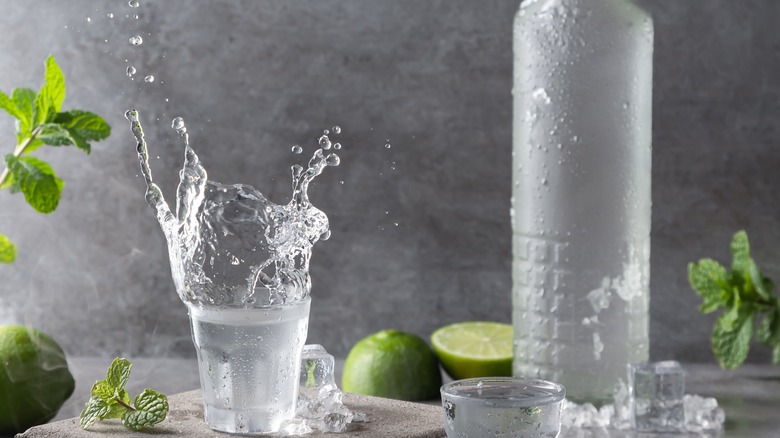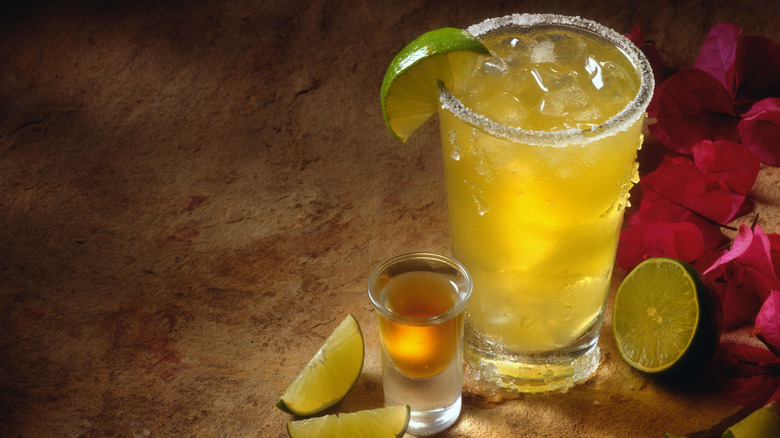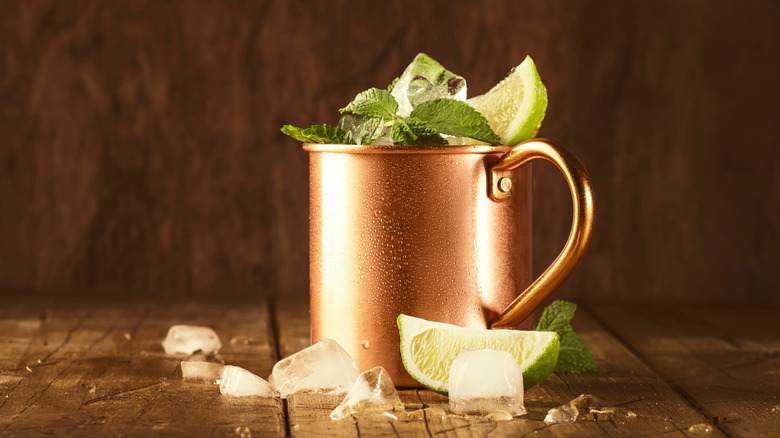8 Alcoholic Drinks That Will Upgrade Your Meat Marinades
Transforming the taste and texture of meat before cooking can be challenging. The trick that works nearly every time is using a marinade. Vital ingredients in most marinades work to infuse into the meat in a way that's fairly scientific. Components that are acidic or include enzymes — for example, lemon or lime juice, mangoes, and even salt — help soften the exterior tissue of the meat to let the flavors of the marinade soak through, according to culinary scientist Jessica Gavin. Marinades are the cooking equivalent of an exclamation point on a sentence that needs some flavor and spice.
By infusing the meat with a liquid concoction of spice, citrus, sweet, and other zesty flavors, a simple chicken breast can now offer an explosion of different tastes. However, instead of the run-of-the-mill marinades that are combinations of whatever you have in the pantry or fridge, it might be wise to stretch so far as the bar cart or wine cellar to go even further with your marinade. Alcohol works congruent with other marinade ingredients in the way it chemically breaks down tissue and collagen in meat.
Used carefully in a marinade, alcohol can go further than your standard marinade, particularly with thick cuts of meat that have more areas for the liquid to bind with the fat. As Reddit users have noted, alcohol in marinades can aid greatly in affecting the flavor when soaked for a short period of time, such as with a shaoxing cooking wine for Asian-style recipes. To know which bottles to have on hand in both the kitchen and bar, it's important to remember flavor and how ingredients marry in a marinade.
Vodka
When it comes to using alcohol in cooking, it is once again its chemical reactions that make vodka a standout addition. Everyone knows that water and oil are difficult to blend together into a cohesive mixture, as the two always end up separating. Vodka, however, is a natural emulsifier and can bring together ingredients that would otherwise not cohesively mix — such as water-based vegetables like tomatoes and cream, resulting in an indulgent plate of penne alla vodka.
The same principles apply when preparing food with a marinade. Vodka can penetrate the tissue of the meat-based protein like typical alcohol, and also help bind the other ingredients of the marinade to the protein for richer flavor. Because of its high alcohol content, it's ill advised to use a lot of alcohol in a marinade, or for too long. However, for some proteins this method works perfectly.
Shrimp would be an ideal meat to marinade with vodka as it would not need a long soak, nor too many ingredients to infuse great flavor. One profile that comes to mind are the base flavors in a Bloody Mary, a drink that works well with spicy meats, but can also bring bright, acidic flavor to simple shrimp. Not only does a Bloody Mary already include vodka but the cocktail sometimes feature shrimp as a garnish. Not to mention that many cold shrimp dishes include a serving of cocktail sauce, which features tomato ketchup and horseradish. Used in a lighter mixture of deconstructed Bloody Mary ingredients, this marinade will bring a zesty spin to your shrimp that will take as long to infuse as it will to cook.
Tequila
Anyone who's tried tequila can say that its intense flavor profile is fairly complex. This is most likely due to the distilling process of the blue agave plant that makes up the spirit, and how the taste can change with aging. Some varieties can hit notes that are both earthy and spicy while others boast richer, refined notes that taste sweet and more robust. These multifaceted flavor notes mean that tequila itself can hit a wider array of marks when it comes to taste, leading to more complex flavors when combined into a marinade.
The traditional trio of lime, salt and tequila can work well in your meat marinades. When coaxed into proteins like steak and chicken, these ingredients will together infuse the meat with deep flavor, as all three components soften muscle tissue and make the meat more tender. This can especially help with meats that tend to dry out when cooking or grilling, such as chicken breasts used in grilled citrus tequila chicken tacos. The lime juice will also help quench the meat while cooking to keep it moist, and it will keep in other flavor elements like garlic, onion, and seasonings. Tequila also goes well with seemingly sweeter flavors, such as coconut, or simpler flavors that can use a different punch, such as tomatoes and jalapeños.
Beer
Beer used in combination with cooking is no uncommon pairing, from a hearty serving of beer cheese to share with pretzels to a whole grilled beer can chicken. There are studies that show that combining beer with food can make it not only taste better but be better for you, such as pilsner reducing the amount of carcinogens ingested when marinated with pork (via the American Chemical Society). Because of its chemical makeup, beer can also be used before cooking or grilling meat in more ways than one, guaranteed to saturate the protein with a subtle yeasty, smoky flavor.
One method of marinating meat in beer is to utilize this liquid gold in a brine. As Roger Barth, professor at West Chester University, tells Inverse, before doing so it's best to pick the best beer to pair with meat. A heavier beer with a heavy hoppiness to it will suit richer pieces of meat, such as beef, while a light beer or lager pairs better with white meats and fish. You would then follow suit in making a basic brine with water, salt and sugar, cooking with herbs and seasonings, and letting cool completely before incorporating the beer. This is to ensure the alcohol is not cooked off before marinating the meat, and so that the flavor developed in the brine mixture permeates alongside the alcohol.
Rum
A bottle of rum can go beyond creating your favorite tropical or beach-themed cocktails. With so many variations of rum available there are plenty of ways to utilize this alcohol in marinades that span different proteins — in order to produce different flavor profiles. Take seafood. Either steamed, boiled or fried, the buttery, tender meat morsels of your favorite crustaceans, crab and lobster, complement the light crispness of a white rum, and even underlying sweetness in a dark rum.
Sweetness is a common thread that links all rum varieties, simply on the way it is distilled from molasses. You can commonly see rum used to cook and bake when added to a glaze or incorporated into a boozy rum cake, leaving behind a robust sweetness that is subtle yet present. In a marinade, this sweetness can be used to lighten the heaviness of fattier meats like pork, as well as in tandem with warm spices to carry through the meat. The added sugar of the rum is also a good way to incorporate caramelization into the meat while it cooks or after to flambé, such as in a rum glazed ham. This also gives you added texture in crunchy, roasted bites, with added acidic sweetness from the pineapple and orange juice.
Wine
Wine is one of the best alcohols to use when marinating meat because of the acidity of different wine varieties. According to Science of Cooking, there are three types of acids perceived within winemaking that give certain flavors. Malic gives off the taste of green apples, lactic which gives a creamier mouthfeel and an oaky flavor, and tartaric which is more or less bitter. The acidity of wine breaks down the meat tissue and adheres the flavors of the marinade into the meat. Because of this, it's important to keep in mind how these will interact with the chosen meat proteins.
Pairing wine and meat is practically an art form, although the rules of what goes best with which are hotly discussed and debated among professionals. As master sommelier David Glancy tells Food & Wine, it's "more about the sauce, seasonings, cooking method, and accompaniments." A tannin-rich, red wine will give the meat a drier taste, but that doesn't necessarily mean it needs sweetness to balance, or salt to give more flavor. Nicolas Quillé, master of wine, suggests that a merlot can "stand up well to spicy meat" — you can do the same with marinating a spice-forward meat in a dry red wine to deepen the spices throughout. White wine typically pairs better with white meat, such as sauvignon blanc — however, marinating typical flavor additives like garlic, butter, or cheese, will require a richer white wine like chardonnay.
Whiskey
Just like wines there is a wide world of whiskey that when used in a marinade can enhance the flavors or chosen cooking methods. Red meat is an obvious choice for a heartier spirit like whiskey, as its subtle caramel notes can pair well with the full bodied richness of these cuts. You can take this a step further by cooking the meat in a way that further heightens the flavor. Scotch whiskey, for example, provides a smoky note in its flavor profile, which lends itself incredibly well to a grilled steak or cut of lamb.
The same can be said for another variant of whiskey — bourbon — which is often described to taste more bready or with a strong, wheaty aftertaste. This flavor profile works well in baked goods, but can also work in a meat marinade when combined with sugar, spice, and other umami-based flavors like soy sauce or Worcestershire sauce. When utilizing whiskeys in a marinade, particularly bourbon, it's best to not use too much, as the flavor can overwhelm the meat itself. With higher quality bourbons that don't include as many additives or impurities, you won't need to use much to instill great flavor.
Ginger Beer
Though not a typical beverage that is enjoyed solely on its own, ginger beer is not only acidic but an excellent low-alcohol drink that can and should be used in your next meat marinade. Traditional ginger ale simply uses ginger syrup, while ginger beer is made from ginger that is broken down during the fermentation process, giving it a strong ginger flavor that is all in all much spicier.
In a marinade, this drink can pose incredible flavor effects on simple meats like chicken, or finer cuts of beef and pork. As food blogger Dan Pelosi, aka GrossyPelosi, also notes about ginger beer, "because it's carbonated, it tenderizes [the meat]. A little bit of bubbles makes the meat more tender, so it's a win-win" (via All Recipes). Utilizing the ginger beer also avoids the possible missteps of using raw ginger on meat, which can over-tenderize and create a spongy exterior.
Ginger is often a secondary flavor element to many dishes, so it's best to include other highly flavorful additions to the marinade, including citrus and/or acidic fruit like lime or pineapple, as well as added garlic, oil, and sugar to balance out the acidity.
Gin
The intensity of flavors in gin can make this alcohol either a hit or miss for many cocktail enthusiasts. However, powerful flavors that stand out have their place in creating interesting dishes. A gin marinade will not only saturate the meat with herbaceous taste, but it can be one of the cleanest alcohols to use when cooking.
Gin's dominant flavor profile is primarily botanical, including juniper, lemon, coriander and peppercorn, with some describing it as tasting almost of liquorice. However, the juniper berries used to make gin have numerous health benefits, from improving diabetes and relieving joint pain. Not to mention gin is much lower in sugar and calories when compared to other alcohols and spirits. One study even found that the antioxidants within essential oils of juniper berries also help with anti-aging.
Health aside, in terms of flavor juniper can be intense on its own, but couples nicely with other bright flavors. Lemon and honey pair well with gin in popular cocktails like a bee's knees, a mixture that plays nicely with lighter fish and seafood, including white fish and shrimp. Its impactful flavor also means you won't need a lot to work with, but end up with delicious results.








